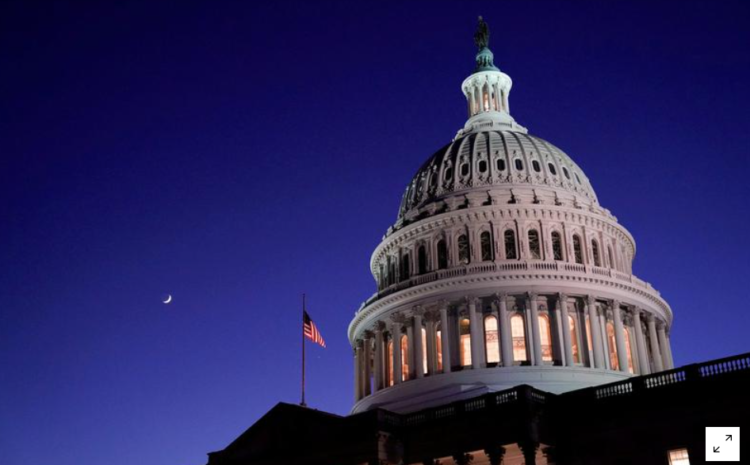WASHINGTON (Reuters) -A new U.S. Congress convened on Sunday in an atmosphere of political uncertainty, with Senate control undecided, a smaller Democratic majority in the House of Representatives and a Republican fight looming over presidential election results.
The House was due to vote on the re-election of California Democrat Nancy Pelosi as speaker, a prospect made more challenging after Democrats lost 11 seats in the November elections to command a narrower 222-212 majority. The vote was expected to take hours due to COVID-19 restrictions.
The Senate remains Republican run ahead of twin elections in Georgia on Tuesday, giving its members a platform to again air President Donald Trump’s baseless claims that his loss to Democratic President-elect Joe Biden was the result of fraud.
Multiple state and federal reviews have found no evidence of the sort of widespread fraud Trump claims, but Republican senators and House members plan to challenge the election result when Congress certifies it on Wednesday.
A Republican push led by Senator Ted Cruz for an emergency 10-day audit of election results in contested battleground states drew criticism on Sunday from Republican Senator Lindsey Graham, a staunch Trump ally.
“It appears to be more of a political dodge than an effective remedy,” Graham said in a statement. “I will listen closely. But they have a high bar to clear.”
But leaders in both the House and Senate tried to sound optimistic despite mounting challenges.
“From political division to a deadly pandemic to adversaries around the world, the hurdles before us are many and they are serious,” Senate Majority Leader Mitch McConnell said on the Senate floor.
“But there is also plenty of reason for hope,” the Kentucky Republican added, citing the ongoing rollout of coronavirus vaccine. “I’d say 2021 looks bright already.”
House Majority Leader Steny Hoyer, the chamber’s No. 2 Democrat, also said in a statement that he hoped the new Congress would “turn the page” on partisan division “and begin a new chapter of cooperation among Democrats and Republicans.”
A smaller Democratic majority and the still-raging coronavirus pandemic could make it trickier for Pelosi to lock down her re-election to that post, although Pelosi and her lieutenants say they are confident she will succeed.
The smaller caucus means less room for dissident Democrats to vote against Pelosi without risking the possibility that Republican leader Kevin McCarthy wins the speakership instead.
Ten of 15 Democrats who opposed Pelosi’s bid for speaker two years ago are returning, and some newly elected progressives, Jamaal Bowman and Cori Bush, recently declined to say whether they back Pelosi.
“I think she’ll have the votes,” Hoyer told reporters last week. “We didn’t … work as hard as we worked to maintain the majority so we could set policy, to give that up.”
The coronavirus could be a wild card affecting attendance in Congress Sunday.
House leaders announced social distancing guidelines that will restrict floor access to no more than 72 lawmakers at a time, forcing lawmakers to vote in groups.
In the Senate, Vice President Mike Pence swore in 32 senators on Sunday, administering the oath of office in pairs due to COVID-19 restrictions.
A Republican win of one or both Georgia Senate seats up for election on Tuesday would cement the Republican majority led by Mitch McConnell.
Twin Democratic wins in Georgia would produce a 50-50 Senate, where Democratic Vice President-elect Kamala Harris would hold the tie-breaking once she is sworn in on Jan. 20.
Reporting by Susan Cornwell; additional reporting by David Morgan and Jonathan Landay; Editing by Lisa Shumaker
Our Standards: The Thomson Reuters Trust Principles

